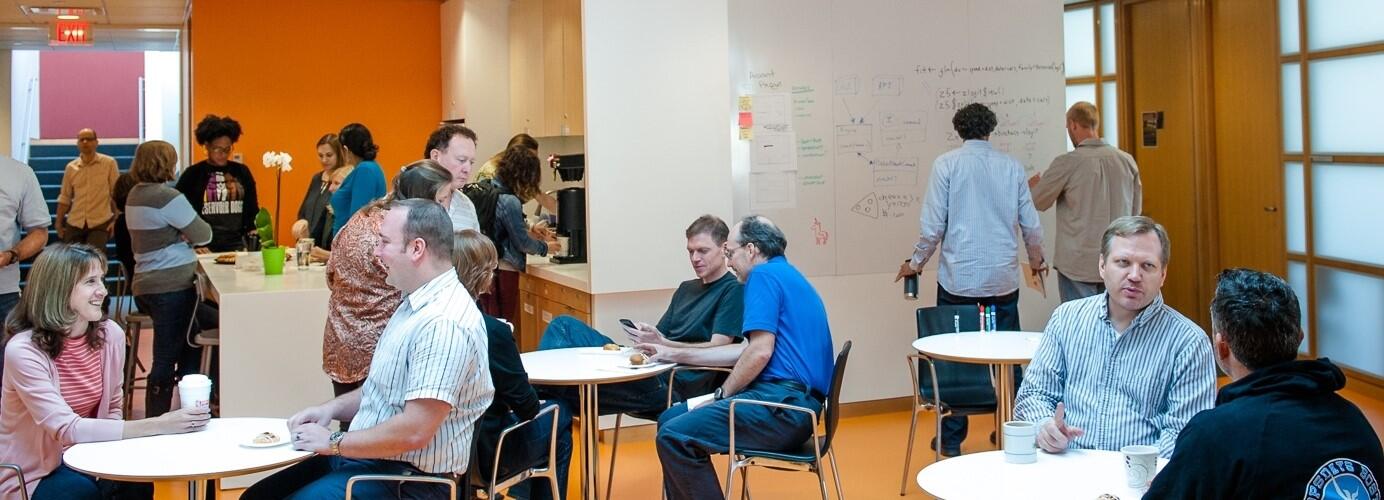
by IQSS staff and Amanda Pearson
Since 2006, Stephen Ansolabehere, the Frank G. Thomson Professor of Government at Harvard University, has been compiling data about who votes in America, and why. He’s the principal investigator for the Cooperative Congressional Election Study (CCES), which is a nationally representative annual sample survey of more than 50,000 American adults stratified by state and administered by the data and analytics group YouGov.
For more than a decade, over 60 universities and institutes have come together to create a large-scale and cooperative academic survey project, which is now a go-to dataset for anyone studying American public opinion and voting patterns. Within CCES is a treasure trove of data that political scientists and analysts use to determine what citizens think about policies and the politicians who create them.

Stephen Ansolabehere, Co-PI of CCES
Ansolabehere, an IQSS Faculty Affiliate, now runs CCES with his fellow data crunchers, Brian Schaffner of Tufts University and Samantha Luks of YouGov, who use sophisticated methodologies and intricate statistical analyses to evaluate American elections, public opinion, and voting behavior.
The CCES survey is conducted annually, but in an election year, Ansolabehere explains, the survey is administered in two waves: in the pre-election wave, from late September to late October, respondents answer questions about their general political attitudes, various demographic factors, and voting intentions; in the post-election wave, administered in November, the questions focus on who respondents voted for and why.
Partially funded by the National Science Foundation (NSF) since 2010, each CCES questionnaire has two sections: Half of the survey questions (“common content”) are administered to all 50,000+ survey respondents, and half of the questions are “team content,” designed by the dozens of participating teams from different universities and administered to just a subset of 1,000 respondents. Each year the principal investigators refer to the Congressional agenda to write several new survey questions that capture respondents’ opinions about concrete issues (e.g., Trump’s executive order to withdraw from the Paris Agreement on climate change) instead of abstract ones (e.g., views about global warming).
On Pandemics and Policing: Surveying What Americans Think about Current Crises
As the world grapples with the far-reaching effects of a global pandemic, for the 2020 election the NSF wants to incentivize research teams to ask questions about two major crises that are facing the United States: COVID-19, and discrimination and policing. The pre- and post-election waves of the CCES survey will invariably yield valuable data revealing Americans’ feelings about what is at stake in 2020. For example, questions about the COVID-19 pandemic can focus on its all-encompassing disruption or on specific social, economic, or health consequences.
“People in office are punished when times are bad, and rewarded in good times,” said Ansolabehere, who will be interested to see statistics about recent Supreme Court decisions, executive orders by the Trump Administration, and COVID-19, since respondents who have been hit hard by the pandemic might “evaluate the government accordingly.”
Similarly, the 2020 survey asks respondents about their support for a range of questions about policing, such as whether to eliminate mandatory minimum sentences for non-violent drug offenders, whether to require police officers to wear body cameras that record all of their activities while on duty, or whether to end the Department of Defense program that sends surplus military weapons and equipment to police departments.
Although events like natural disasters that occur before an election have had localized effects on survey responses, “we’ve never seen how an election will fare under something as unusual as a pandemic,” Ansolabehere says.

Shiro Kuriwaki, PhD Candidate, Department of Government
Questions for the 2020 survey were submitted to YouGov in July and early August, but Harvard graduate student Shiro Kuriwaki says, “we do ask for exceptions in September to add more questions as needed. This year is overwhelming in terms of what to focus on” because there are so many important issues that researchers want to understand better.
Taking the Pulse of the American Electorate
CCES has become an important baseline survey that pollsters and political scientists turn to first for background research and context about how Americans view Congress and hold their representatives accountable during elections, how they vote, and how their voting behavior varies with political geography and social context. It attempts to cover all corners of American politics by posing broad questions that are of interest to scholars researching Congress, the Presidency, the Supreme Court, and elections at all levels of government. But the survey also seeks to take voters’ temperatures on specific current policy topics, which in recent years have included hot-button issues like gun control, immigration, taxes, and healthcare policy.
A cumulative dataset of all responses from 2006 is published through IQSS and available to the public on the Harvard Dataverse. CCES has interviewed 500,000 people since 2006 so there’s a lot of data to review, says Ansolabehere. Many scholars, media outlets such as FiveThirtyEight, and analysts such as Cook Political Report, all use the data, and CCES has been referenced in hundreds of blog posts and newspaper articles, including the New York Times and the Washington Post, and in an equally large number of peer-reviewed journal articles.
“Because of its size, the CCES helps us answer questions that other surveys are too small to address. For example, understanding what drove some 2012 Obama voters to support Trump in 2016 is something you can only do with the CCES,” Schaffner says.
Helping Scholars Evaluate American Elections and Public Opinion
There are myriad ways that scholars can mine the CCES data for their research.
IQSS Faculty Affiliates Matt Blackwell and Maya Sen used its data in their award-winning book Deep Roots: “Our research looks at how slavery impacts contemporary political attitudes. Our way of measuring the latter comes via the CCES, which we used to see what people across the South think about key issues involving partisanship, affirmative action, race relations, and equality. The CCES was crucial to our work not only because it asks important questions, but also because it has excellent geographic coverage, which we needed to match to our county-level historical data. We relied on the CCES in hundreds of analyses, many of which appear in Deep Roots,” Maya Sen wrote in an email.
Ellen Kraffmiller and Bob Treacy of IQSS are helping to create and develop an indexing text tool for use in archiving. Says Krafmiller, IQSS Software Engineer, “We have used Steve's [CCES’s] survey questionnaires as a dataset to upload into Consilience. Consilience analyzes large sets of text documents, and runs them through multiple clustering algorithms and topic analysis algorithms, which the researcher can browse to learn more about their data. In the case of Steve's [CCES’s] data, we analyzed the text of the questions (as opposed to the participant answers). The idea was to discover trends and common themes across multiple surveys. Also, we indexed the question text, so researchers can do basic searching across all surveys in the dataset.”
And Ansolabehere and Kuriwaki have parsed twelve years of CCES data to understand how Americans have historically held their congressional representatives accountable for their legislative decisions. Their forthcoming article in the American Journal of Political Science shows how voters come to perceive the decisions their Members of Congress take on various issues ranging from healthcare to war and vote accordingly, although these large effects tend to cancel out at the district level. Since political accountability is a cornerstone of theories about democracy, CCES’s ability to measure it is a powerful tool.
